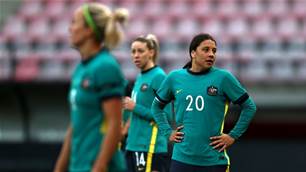OLIVER Kahn has criticised Germany in the wake of their incredible draw with Sweden, suggesting the team lacks mental strength.
Leading 4-0 after an hour of play, the Germans conceded four goals in the remaining 30 minutes of the match to only come away with a point.
It was a remarkable turnaround that former goalkeeper Kahn believes should never have occurred.
"That was astonishing, considering the German team dominated the match until the 60th minute, it was uniquely stupid," Kahn said.
"At 4-2 at the least, focus should have been on securing the result, stabilising the defence. It appears to me that this team cannot react appropriately to extreme situations – a plan B is missing.
"On the pitch there is little communication, little atmosphere. After conceding at 4-2 against Sweden, one had the impression that collective fear and paralysis was spreading [among the team].
"When you're in the lead like that, you automatically shift down a gear. The opponent isn't taken that serious anymore.
"When you're clearly in the lead and then begin to rebuild the opponent, you have more to lose [than before]. Then it can turn quickly.
"It's 4-3 and you get nervous as a logical consequence. The opponents suddenly are outdoing themselves. But the team who was on the pitch was experienced enough to not let that happen."
It was a stunning comeback by the Swedes, led ably by their captain Zlatan Ibrahimovic who netted their first goal. However, Kahn's criticism has focused on just how his former side allowed the Scandinavians back into the game.
"The German defensive line is showing weaknesses if put under pressure, as demonstrated by Austria as well," he continued.
"His [Joachim Loew's] task should be to not only refine the team tactically, but to also give them mental stability.
"I didn't attack anyone [after the game], I criticised objectively. It's clearly apparent now that the team concedes too many goals."
Kahn concluded by suggesting that the team could also add a bit more physicality to their game and that the focus should not be simply on playing intelligent football.
"It's a relatively non-physical approach by the German XI. Low requires high intelligence in one-on-one situations of his players," he added.
"He doesn't want to see nonsensical fouls in the danger zone 30 metres in front of the goal. However, there are phases where sometimes one-on-ones have to be approached in a rough way. The opponent has to feel that he is reaching his limits."
Related Articles

‘Very upset’ Matildas don’t want to play a ‘simple game’

Harsh history shows Matildas beating Sweden is a very rare feat













